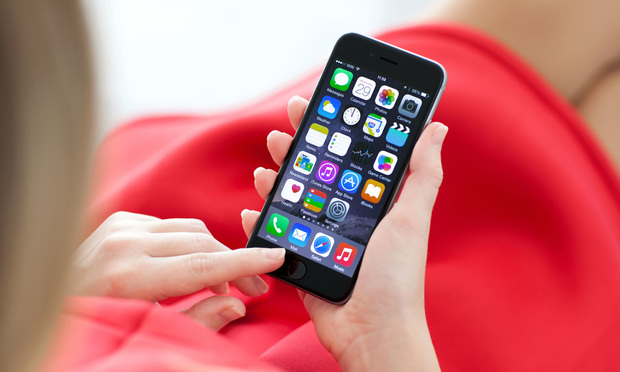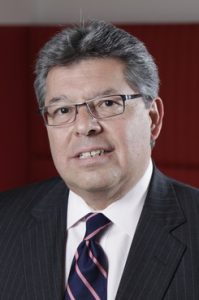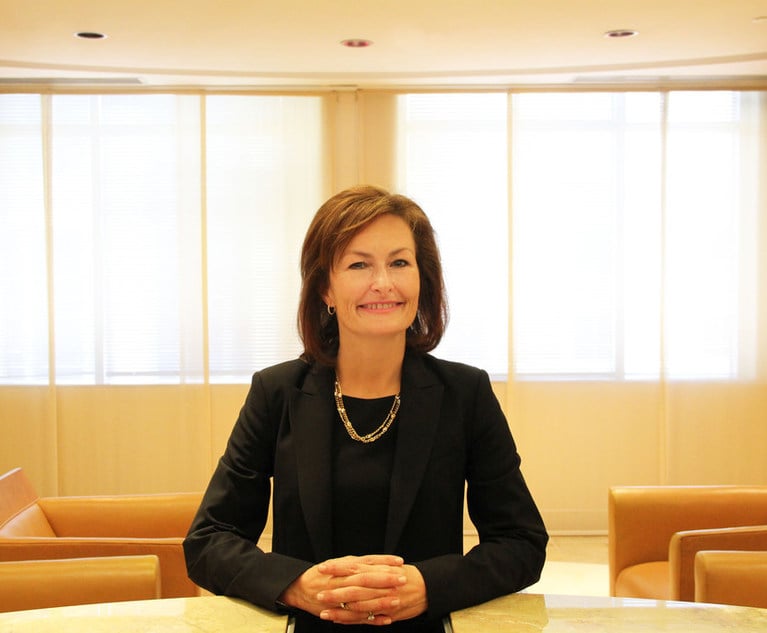In iPhone Defect MDL, Judge Waves on Privacy, Trespass Claims, Nixes Consumer Claims
"The court finds that some of plaintiffs' allegations are at full capacity, but others need to be recharged," wrote Judge Edward Davila.
October 01, 2018 at 03:42 PM
4 minute read
 Apple Inc.'s iPhone 6.
Apple Inc.'s iPhone 6.
The federal judge overseeing litigation against Apple Inc. accusing the company of surreptitiously slowing the speeds of certain iPhones has largely allowed claims brought under California and federal computer privacy laws to proceed against the company.
But U.S. District Judge Edward Davila of the Northern District of California in a 39-page order issued Monday largely sided with Apple on separate claims brought under California's consumer protection laws.
 U.S. District Judge Edward Davila of the Northern District of California.
U.S. District Judge Edward Davila of the Northern District of California.“The court finds that some of plaintiffs' allegations are at full capacity, but others need to be recharged,” wrote Davila, who gave plaintiffs another shot at pleading all the claims he dismissed.
Davila's ruling came in response to the company's first attempt to narrow the multidistrict litigation—a motion to dismiss filed by the company's lawyers at Gibson, Dunn & Crutcher. Apple argued that customers had authorized Apple to install software on the affected iPhones and that the decreased performance speed was a trade-off to squelch sudden, unexpected shutdowns.
But Davila found that Apple had not indicated to customers that the software update they had agreed to download would slow the processing speeds on their phones. “In this way, even though plaintiffs voluntarily installed the iOS updates, they never gave permission for Apple to cause damage to their iPhones,” Davila wrote.
Davila, however, found that the plaintiffs' argument that the devices' batteries were fundamentally mismatched with the phones' processing and software needs “buckle[d] under its own weight.”
“Although the asserted defects affect the operation of the processors in plaintiffs' devices and can cause those devices to shut down and remain dead until reconnected to power, plaintiffs do not satisfactorily plead the circumstances necessary to trigger Apple's duty to disclose” the defects, Davila wrote. “As plaintiffs' own allegations demonstrate, consumers are fully aware of the facts regarding software capability and battery capacity. … In reality, plaintiffs apparently seek to hold Apple liable for failing to provide a battery that lasted as long as plaintiffs preferred.”
Also in Monday's ruling, Davila turned back Apple's request to limit the suit to claims of just U.S. citizens who purchased their devices stateside. Davila wrote that the practical and constitutional issues Apple's lawyers raised about potentially opening the case up to foreign claims would be “better addressed at a later stage of the proceedings, such as class certification.”
Gibson Dunn's Christopher Chorba, who argued Apple's motion to dismiss last week, didn't immediately respond to a message Monday.
Plaintiffs are represented in the case by a 39-lawyer team led by Joseph Cotchett of Cotchett, Pitre & McCarthy in Burlingame and Laurence King of Kaplan Fox & Kilsheimer in San Francisco.
Mark Molumphy of Cotchett of Cotchett said Monday afternoon that the plaintiffs team was “very pleased with the overall order,” in particular the judge's “rejection of the idea that the non-residents can't pursue claims in this court.”
“It's full-speed ahead with the throttling theory of the case,”Molumphy said.
Read the judge's order below:
Read more:
Apple Lawyer Says 'Anti-Hacking,' Trespass Claims Don't Belong in iPhone Defect Suit
Apple to Take Its First Shots at Narrowing Suits Over Throttled iPhones
This content has been archived. It is available through our partners, LexisNexis® and Bloomberg Law.
To view this content, please continue to their sites.
Not a Lexis Subscriber?
Subscribe Now
Not a Bloomberg Law Subscriber?
Subscribe Now
NOT FOR REPRINT
© 2025 ALM Global, LLC, All Rights Reserved. Request academic re-use from www.copyright.com. All other uses, submit a request to [email protected]. For more information visit Asset & Logo Licensing.
You Might Like
View All
Semiconductor Component Maker Accused of Deceiving Investors About Market Downturn, Export Curbs
3 minute read
Andrei Iancu Gets a Warm Welcome—but Might Leave Federal Circuit Empty-Handed

Nvidia, Dell and Nintendo Face Patent Suit Over Semiconductor Packaging

Morgan Lewis Defends HP Against Class Action Claims of Intentionally Designed Defective Printers
Trending Stories
Who Got The Work
J. Brugh Lower of Gibbons has entered an appearance for industrial equipment supplier Devco Corporation in a pending trademark infringement lawsuit. The suit, accusing the defendant of selling knock-off Graco products, was filed Dec. 18 in New Jersey District Court by Rivkin Radler on behalf of Graco Inc. and Graco Minnesota. The case, assigned to U.S. District Judge Zahid N. Quraishi, is 3:24-cv-11294, Graco Inc. et al v. Devco Corporation.
Who Got The Work
Rebecca Maller-Stein and Kent A. Yalowitz of Arnold & Porter Kaye Scholer have entered their appearances for Hanaco Venture Capital and its executives, Lior Prosor and David Frankel, in a pending securities lawsuit. The action, filed on Dec. 24 in New York Southern District Court by Zell, Aron & Co. on behalf of Goldeneye Advisors, accuses the defendants of negligently and fraudulently managing the plaintiff's $1 million investment. The case, assigned to U.S. District Judge Vernon S. Broderick, is 1:24-cv-09918, Goldeneye Advisors, LLC v. Hanaco Venture Capital, Ltd. et al.
Who Got The Work
Attorneys from A&O Shearman has stepped in as defense counsel for Toronto-Dominion Bank and other defendants in a pending securities class action. The suit, filed Dec. 11 in New York Southern District Court by Bleichmar Fonti & Auld, accuses the defendants of concealing the bank's 'pervasive' deficiencies in regards to its compliance with the Bank Secrecy Act and the quality of its anti-money laundering controls. The case, assigned to U.S. District Judge Arun Subramanian, is 1:24-cv-09445, Gonzalez v. The Toronto-Dominion Bank et al.
Who Got The Work
Crown Castle International, a Pennsylvania company providing shared communications infrastructure, has turned to Luke D. Wolf of Gordon Rees Scully Mansukhani to fend off a pending breach-of-contract lawsuit. The court action, filed Nov. 25 in Michigan Eastern District Court by Hooper Hathaway PC on behalf of The Town Residences LLC, accuses Crown Castle of failing to transfer approximately $30,000 in utility payments from T-Mobile in breach of a roof-top lease and assignment agreement. The case, assigned to U.S. District Judge Susan K. Declercq, is 2:24-cv-13131, The Town Residences LLC v. T-Mobile US, Inc. et al.
Who Got The Work
Wilfred P. Coronato and Daniel M. Schwartz of McCarter & English have stepped in as defense counsel to Electrolux Home Products Inc. in a pending product liability lawsuit. The court action, filed Nov. 26 in New York Eastern District Court by Poulos Lopiccolo PC and Nagel Rice LLP on behalf of David Stern, alleges that the defendant's refrigerators’ drawers and shelving repeatedly break and fall apart within months after purchase. The case, assigned to U.S. District Judge Joan M. Azrack, is 2:24-cv-08204, Stern v. Electrolux Home Products, Inc.
Featured Firms
Law Offices of Gary Martin Hays & Associates, P.C.
(470) 294-1674
Law Offices of Mark E. Salomone
(857) 444-6468
Smith & Hassler
(713) 739-1250






